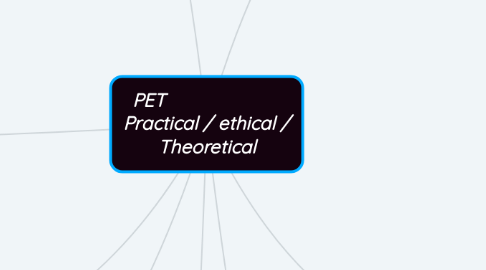
1. Practical
1.1. How do able the experiment is
1.1.1. Money- budgets
1.1.2. Accessibility- to environments and equipments
1.1.3. Protection from harm- the topic of the study can affect this
1.1.4. Laws - stop researchers from conducting complicated experiments on vulnerable topics.
1.1.5. Funding body- meeting requirements
1.1.6. Personal characteristics of the researcher
1.1.7. subject matter
1.1.8. Research opportunity
2. Quantitative / Qualitative data
2.1. Quantitative Data
2.1.1. Information in a numerical form. For example statistics.
2.2. Qualitative Data
2.2.1. Gives an idea of what something is like. This is written letter / word form results.
3. Stanford Prison Experiment- UNETHICAL
3.1. University students contributed in an experiment whereby they were both split into 2 groups, one group were prisoners and the other prison guards. An artificial prison was created and the participants were told the guards had to control the prisoners, without harming them. However after 10 days the experiment was stopped as the prisoners were showing signs of mental issues as the guards started to think they were real guards in a real prison.
4. Methodological Perspectives
4.1. Positivists
4.1.1. Believe that sociological research should be carried out in the same way as natural scientists.
4.1.2. Believe that quantitative methods are the best for achieving reliable data.
4.2. Interpretivists
4.2.1. See the word as a socially constructed place.
4.2.2. Use qualitative research methods because this leads to greater validity.
5. Pilot Study
5.1. A study conducted before the real study takes place to avoid issues and mistakes.
5.2. This costs money but can prevent issues with the credibility and validity.
6. Ethical
6.1. How moral.
6.1.1. Vulnerable groups- Should take care when participants may be vulnerable.
6.1.1.1. Elderly
6.1.1.2. Children
6.1.1.3. Mentally ill
6.1.1.4. Physically ill
6.1.2. Fair- can the the results truly represent the participants and the sample?
6.1.3. The sample- the population and participants the researchers are using
6.1.4. Informed consent- Participants should be offered the right to refuse to be involved.
6.1.5. Confidentiality- The identity of the participants must be kept private and also any documents.
6.1.6. Protection of participants- Researchers mus consider the effects the study may have on the participants.
6.1.7. Deception- They should not deceive people to gain their trust and do covert research.
6.2. The British Sociological Association set out ethical guidelines for the conduct of research
7. Theoretical
7.1. How accurate the research method is.
7.1.1. Validity- accuracy / true to life
7.1.2. Reliability- Repeatability
7.1.3. Representativeness- Represents society / target audience / wider society after this the results can be generalised.
8. Primary / Secondary Data
8.1. Primary data
8.1.1. Observations- Sociologists joins in the activities they are studying.
8.1.2. Social Surveys- Asking people questions in a written questionnaire or interview.
8.1.2.1. Advantage- Primary data allows the research to be directly applicable, meaning that the research is reliable.
8.1.3. Experiments- Sociologists rarely use Lab experiments but they sometimes use field experiments.
8.2. Secondary data
8.2.1. Official Statistics- Produced by the Government on a wide range of issues EG. crime / divorce. These can also be produced by businesses, churches and charitable events.
8.2.1.1. Advantage: Secondary data can be quick and save money as the researchers do not need to conduct an experiment as they're using someone else's data and research.
8.2.2. Documents- Such as letters, emails, diaries and photographs
